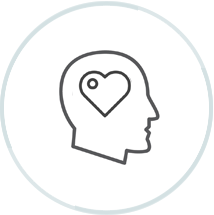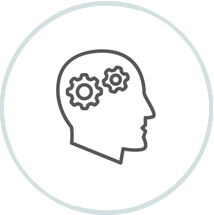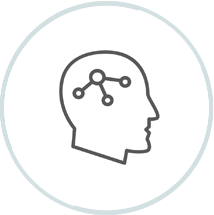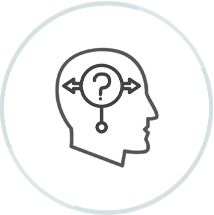
Cognitive Behavioural Therapy
CBT is a form of talking therapy which looks at the way in which our thoughts and beliefs about events both present and past affect our behaviour and our feelings. It also looks at how the things we think we have learned through experiences (e.g. I was once bitten by a dog so dogs are dangerous) can negatively affect us e.g. feeling afraid of dogs so going on long detours to avoid them, and helps people gently unlearn those behaviours and free them of their fears and unwanted behaviours.
CBT methods can be used to treat many different mental health problems and can be very effective at enabling people to take control of their anxiety, depression, stress, negative thinking patterns, phobias, panic attacks, post-traumatic stress and many other problems.
A simple example of how our thoughts about a particular situation or event can affect us is below:
See example
Situation A: An invitation to a friend’s wedding drops though the door
Thoughts 1: Oh that’s wonderful, I’m so happy for them. They always put on a good bash, it’ll be great. I am really looking forward to seeing them again, it’s been ages…
Feelings: Happy, excited
Behaviour:Smiling, relaxed but alert
Thoughts 2: I feel really lucky to have been invited…etc
Or it might instead go like this…
Situation B: An invitation to a friend’s wedding drops though the door
Thoughts 1: Oh no, not another wedding. Why is it always everyone else getting happily married why did they bother inviting me anyway, it’s been ages since we saw each other…?
Feelings: sad, anxious, tired, lonely
Behaviour: body tenses, posture slumps, heart-rate increases, tearful
Thoughts 2: I won't be able to cope if I go… I won't know anyone and I am going to feel rubbish if I go, just sitting there on my own… etc
This is what is known as a vicious cycle – in other words the sequence of thoughts creates feelings which affect behaviour which increases thoughts etc. and the person can get stuck in this cycle.
In situation A, the person will no doubt attend the wedding in a positive frame of mind and is likely to find themselves having fun with lots of people to socialise with.
In situation B, if the person can even bring themselves to go, the negative frame of mind they have established is likely to make socialising a difficult experience – at that point, their experience of the wedding will in fact become as they predicted and will reinforce further negative thinking and behaviours in the future.
CBT works with the person experiencing situation B to understand the origins of the negative thoughts, help them find alternative more helpful ways of thinking, and also if appropriate support the person in trying out new behaviours and recording the results so that this can provide new positive evidence to support new ways of thinking.

Person Centred Therapy
Person centred therapy is about the creation of a safe and non-judgemental relationship space in which a person can relearn to be themselves while they explore the things that are causing them emotional distress. Carl Rogers, the founder of Person Centred therapy believed that each person deep inside knew what they needed to grow and be happy, but that the external world’s demands (parents, family, work, friends, society) could make them lose touch with that inner knowledge and that this gave rise to feelings of being unable to cope, and unsure of oneself.
Person Centred therapy is effective for all forms of psychological distress, and its theory forms the basis of most therapeutic relationships.

Integrative Therapy
Integrative therapy seeks to combine the best feature of two or more distinct models of therapy for the benefit of the client. Working integratively enables a therapist to tailor the therapy to best meet the needs of that individual and work flexibly.

EMDR
Eye Movement Desensitisation and Reprogramming was devised in the early 1980s by Helen Shapiro and has been approved by both NICE and the WHO as an effective trauma therapy. It has been shown to be effective in treating PTSD related symptoms caused by distressing events and the problems they have caused such as flashbacks, intrusive thoughts and images, anxiety and depression.
EMDR uses a light bar and bilateral stimulation to induce the processing of stuck emotional experiences can be delivered both face to face and also online using an easy to use specialist platform. Sessions may last up to 90 minutes.

Solution Focussed Brief Therapy
Solution-focused therapy is an approach to psychotherapy based on solution-building rather than problem-solving. Although it acknowledges present problems and past causes, it predominantly explores an individual's current resources, options and future hopes. This can help them to look forward to the future and use their own strengths to achieve their goals.
As its name suggests, solution-focused brief therapy is considered a time-limited approach, however, the technique is often incorporated into other long-term therapy types and effects can be long-lasting.
